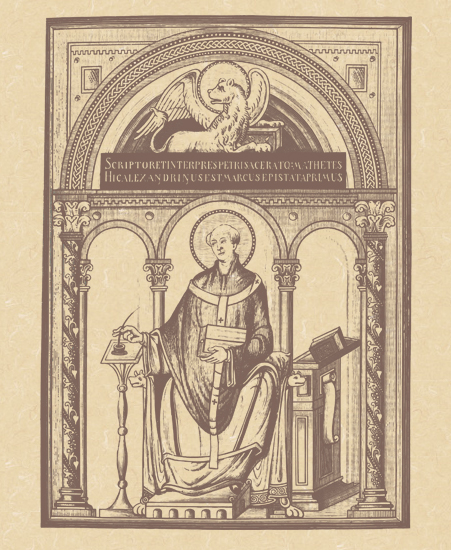Forgive and Forget.
The Fourth Thursday of Easter.
Lessons from the feria, according to the ordinary form of the Roman Rite:
• Acts 13: 13-25.
• Psalm 89: 2-3, 21-22, 25, 27.
• John 13: 16-20.
The Third Class Feast of Saint Ubald, Bishop & Confessor.*
Lessons from the common "Státuit…" of a Confessor Bishop, according to the extraordinary form of the Roman Rite:
• Ecclesiasticus 44: 16-27; 45: 3-20.
• [The Gradual Psalm is omitted in the Easter Season.]
• Matthew 25: 14-23.
FatherVenditti.com
|
 8:50 PM 5/16/2019 — Today’s first lesson from Acts shows a somewhat unflattering side of our Apostolic companions, if you know the background. Most of the lesson is Paul’s sermon in the synagogue in Antioch; but, in the very beginning of the lesson Saint Luke makes a terse but curious comment: “From Paphos, Paul and his companions set sail and arrived at Perga in Pamphylia. But John left them and returned to Jerusalem” (13: 13-14 RM3). The “John” being spoken of, as Saint Luke had already told us earlier in Acts, is also sometimes called Mark, and is the same who went on to compose the second Gospel; he is the cousin of Paul’s assistant, Barnabas. At this point, Saint Luke does not tell us why he returned to Jerusalem, but events that take place later in the book allow us to deduce it. 8:50 PM 5/16/2019 — Today’s first lesson from Acts shows a somewhat unflattering side of our Apostolic companions, if you know the background. Most of the lesson is Paul’s sermon in the synagogue in Antioch; but, in the very beginning of the lesson Saint Luke makes a terse but curious comment: “From Paphos, Paul and his companions set sail and arrived at Perga in Pamphylia. But John left them and returned to Jerusalem” (13: 13-14 RM3). The “John” being spoken of, as Saint Luke had already told us earlier in Acts, is also sometimes called Mark, and is the same who went on to compose the second Gospel; he is the cousin of Paul’s assistant, Barnabas. At this point, Saint Luke does not tell us why he returned to Jerusalem, but events that take place later in the book allow us to deduce it.
This is Paul’s first missionary journey, and Mark seems not to have been up to the challenge. You can, if you want, read into it that he might have experienced a crisis of faith of some sort; or, maybe he was simply not physically up to the journey. Much later on, when Paul was preparing for his second missionary journey, Barnabas again wanted to bring his cousin along, and Paul refused; he felt that “John-called-Mark” wasn’t reliable, and this dispute caused a rift between Paul and Barnabas which resulted in their separation, with Barnabas taking his cousin and sailing on for Cyprus, and Paul replacing his old assistant with Silas.
The book goes on to chronicle the activities of Paul and Silas, and we don’t hear too much more about Barnabas and Mark, at least not in Acts; but, writing to the Colossians, Paul mentions that “John-called-Mark” had been a great comfort to him (cf Col. 4: 10-11), and later recommends him to Timothy (cf. 2 Tim. 4: 11). So, within a few years, Mark was once more a friend and an effective partner of the Apostle to the Gentiles.
People can change, and when we have to judge them by their outward behavior—keeping in mind that we can’t see their intentions—we can’t allow our judgment to be fixed and unchangeable. Everybody has defects. When we encounter someone who seems unattractive to us because of some defect of personality that repulses us, it’s wise not to forget that he or she may be having the same reaction to something they perceive in us; and, while Christ does not love our shortcomings, He loves us despite our many defects.
Paul gives us a good example of how a Christian should always be willing to give someone a second chance. Mark, for his part, gives an example, too: he must have been very hurt at being rejected by Paul at the beginning of the second missionary journey, but that didn’t stop him from being there when he was needed, comforting Paul in prison and carrying on the work after him, later on serving as Peter’s translator of Paul’s writings in Rome, and collaborating with him to produce an important account of the Life of Our Blessed Lord.
To forgive and forget for us is a cliché. For the Apostles it was the essence of humility and charity, and the common element among them that allowed the faith to grow and spread. Let us pray that it will also be so for us.

* Ubald was consecrated Bishop of Gubbio in Umbria (Italy); the exact date in unknown. He died in AD 1160. His body is incorrupt even up to our time.
|

